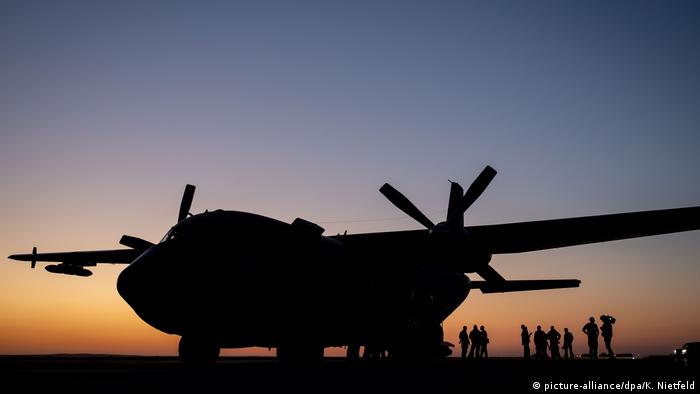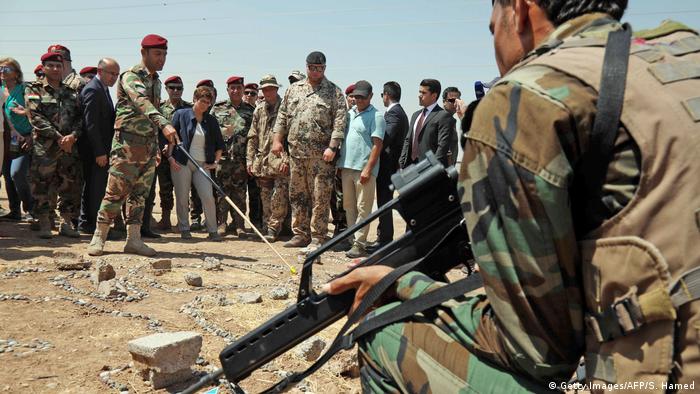What can Germany do to stabilize Syria, military, humanitarian, diplomatic? In addition, the Bundestag has to decide soon, if an extension of the Bundeswehr mandate is pending.

Without the extension of Germany’s Anti-IS mandate on December 31, would. October ends. But an extension by the Bundestag is not a matter of routine, even within the Grand coalition, the opinions diverge. The mandate for 2015. His aim is – within an international Alliance in the fight against the self-proclaimed Islamic state (IS). According to U.S. information, the IS has been weakened significantly since, but not completely defeated.
German Chancellor Angela Merkel’s CDU wants to clear a continuation of the Mission. The CDU foreign policy expert Juergen Hardt is convinced, “is that all the components of the previous bet, are in the future, useful, and desirable”.
Of doubt, in the case of the government party, the SPD
The Junior partner in the coalition, the social Democrats, though, there is doubt. The SPD Deputy Siemtje Möller has recently accompanied the new CDU defense Minister Annegret Kramp-Karrenbauer during a trip to Iraq and to Jordan, where the Minister for an extension of the Mandate advertised. Möller said the Deutsche Welle, the tactical air reconnaissance have “made a meaningful contribution”, but Kramp cart Builder’s predecessor, Ursula von der Leyen promised the Bundestag, to stop the Anti-IS mandate.
Jürgen Trittin of the opposition Greens keeps the IS clearly a threat to German security, also because of around a thousand German citizens have gone to Syria and the surrounding countries to fight for the IS. Nevertheless, Trittin rejects the Mission, for reasons of principle. The use is not covered “under international law. This is a coalition of the willing, which operates without a mandate from the security Council on the territory of another state,” said Trittin, in an interview with Deutsche Welle.
Re-evaluation of the situation
The tasks of the German armed forces in the field are primarily the aerial reconnaissance and the exchange of information with other participants of the coalition, as well as the air to air refuelling. Under German leadership, Iraq will be trained security forces.

Reconnaissance Tornados of the German air force in the Jordanian Al-Asrak are part of the Anti-IS operation
Siemtje Möller says that the Iraqi side wish, especially help in the reconstruction of schools, hospitals, bridges and roads, but “very little military support”. Since all of the Bundeswehr’s missions must be approved by the Bundestag, to talk about the “needs of Iraq”, whether military capabilities are still necessary, and if so, to what extent and for how long.
A gesture to Trump
The air reconnaissance and refuelling by the German armed forces is taking place not only over Iraq but also over Syria. Washington has asked the Federal government a few weeks ago, to an extension of the Mandate of its Anti-IS operation. The demand that Germany should deploy troops on the ground in Syria, however, it was rejected promptly.
An extension of the Mandate of the existing Mission, however, is in the discussion. The middle East expert André Bank, the Hamburg-based GIGA Institute believes that if an extension of the Mandate comes through, it would be “more of a gesture towards the Americans”. The German military use, have little sense that he was just another “in an already highly militarized Middle East”.
A Difficult Balancing Act
In addition to its military contribution, Germany is making since 2012, humanitarian assistance in the Region. According to Figures from the Federal foreign office in Berlin, has spent more than three billion euros in Syria and the neighboring countries, mainly Lebanon, Jordan and Turkey. Alone in the year 2018, there were 622 million euros. This makes Germany the second largest donor in the Region after the United States.

Defence Minister Kramp-Karrenbauer, the training mission in Northern Iraq to explain
In the Syria policy, Germany is faced with a difficult internal political Situation. André Bank, Germany’s relations with Syria are “much stronger” than that of other European countries. Reason, only the high number of Syrian refugees in Germany, but also the Turks living in Germany, and Kurds are not. “Whenever the German government is taking a very strong one-sided Position, the internal political consequences,” says Bank. That is one reason, why the German policy on Syria was “less confrontational”.
Germany as a mediator?
The SPD politician Siemtje Möller would see Germany as a mediator in the Syria conflict. Even if this is unlikely, because the regional and supra-regional powers involved in the conflict, have the Say, says middle East expert Bank, Germany could play in the stabilization of Syria “an important facilitating role”.
The Bank argues, because Germany had in the Region of a strong colonial past, and not clearly in favour of a militarisation of the Opposition had occurred, considered the Syrian government, but also the international supporters like Russia and Iran is Germany “as an actor, to talk, and with a kind of solution can be found”. Although the Bank looks for Germany only “very limited influence”, but that Berlin can play through bilateral Meetings with Russia and, in another frame, also together with Turkey a role.
In the coming months, the Bundestag, will debate, once again over the Anti-IS mandate. The members are divided over the military role of Germany in the Region. Agreed they are, after all, that measures for the stabilization of Syria should be run through the United Nations. But just at the Moment seems unlikely. The CDU foreign policy expert Hardt calls it “frustrating” that “without a in Russia do not want to come in this Situation”.